George Raymond Johnson
George Raymond Johnson (7 February 1840 – 25 November 1898) was an English architect who designed several buildings in the Australia. Johnson is principally notable for the design of seven town halls that still stand today in Melbourne and other Victorian towns, but he achieved contemporary renown for his theatres[1] and, particularly, his annexes to the Melbourne Exhibition Building.[2]
Biography
Johnson was born in Southgate, England (then a part of Middlesex) and at age 13 began working with George Hall, Midland Railway architect. At 19 he moved to London, presumably to continue his architectural career.[1] On 24 July 1962 he married Emma Louise Wood and, nine days later, the couple embarked on a journey of emigration to Queensland.[1] In 1867, Johnson moved to Melbourne, where he produced most of his major works. In 1898, while at sea on return to Melbourne from Perth, Western Australia, Johnson contracted septicemia, and died.[2]
Architectural works
Johnson's major works are mostly Classical in style, variously described as Renaissance Revival, Free Classical, Italianate, Second Empire or Mannerist.[1][2] Some of his residential buildings were in the Gothic Revival style.[1][3]
A selection of Johnson's notable buildings are listed below. For a complete list of known works, see the database compiled by Johnson's descendent, architect Peter Johnson, included in Hannan (2006).[1]
| Building | Location | Year | Type | Note | |
|---|---|---|---|---|---|
| Prince of Wales Opera House | Bourke Street, Melbourne, Victoria, | 1872 | theatre | demolished 1900 |  |
| Eastern Arcade | Bourke Street, Melbourne, Victoria | 1872 | commercial | modified 1894, demolished 2008[4] | 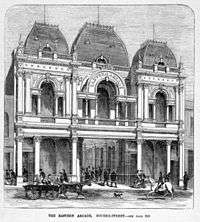 |
| North Melbourne Town Hall | North Melbourne, Victoria | 1876 | town hall | Now Trading As Arts House |  |
| Theatre Royal, Adelaide | Hindley Street, Adelaide | 1878 | theatre | demolished 1962 |  |
| Metropolitan Meat Market | North Melbourne, Victoria | 1880 | commercial | Now a performance and events venue
Trading as Meat Market |
|
| Austin Hospital for Incurables | Heidelberg, Victoria | 1882 | other | demolished c1970 | 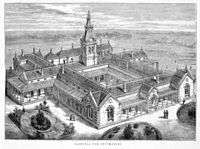 |
| Daylesford Town Hall | Daylesford, Victoria | 1882 | town hall | | |
| Collingwood Town Hall | Collingwood, Victoria | 1885 | town hall |  | |
| Criterion Theatre | Cnr Pitt and Park Street, Sydney | 1886 | theatre | demolished 1935 | 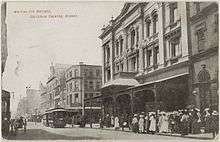 |
| Annexes to Exhibition Building | Carlton, Victoria | 1887 | other | demolished 1889 | 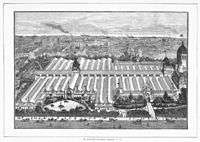 |
| Northcote Town Hall | Northcote, Victoria | 1887 | town hall | 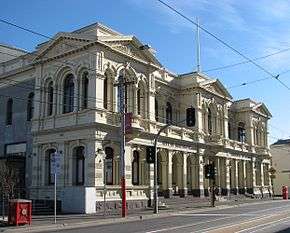 | |
| Fitzroy Town Hall additions | Fitzroy, Victoria | 1887 | town hall |  | |
| Maryborough Town Hall | Maryborough, Victoria | 1887 | town hall | | |
| Bijou Theatre | Bourke Street, Melbourne, Victoria | 1889 | theatre | demolished 1934 |  |
| Kilmore Town Hall | Kilmore, Victoria | 1894 | town hall |  |
References
| Wikimedia Commons has media related to George Raymond Johnson. |
- 1 2 3 4 5 6 Hannan, Bill (2006). Pride of Hotham. North Melbourne: Hotham History Project. ISBN 0-9586111-7-3.
- 1 2 3 Johnson, Peter. Johnson, George Raymond (1840–1898), Australian Dictionary of Biography, National Centre of Biography, Australian National University, accessed 16 August 2011.
- ↑ Peterson, Richard (2005). "Edgewater Towers". A Place of Sensuous Resort: Buildings of St Kilda and Their People. St Kilda Historical Society.
- ↑ Hamish Heard (10 September 2008). "Demolition anger". Melbourne Leader. Archived from the original on 5 October 2011. Retrieved 18 August 2011.